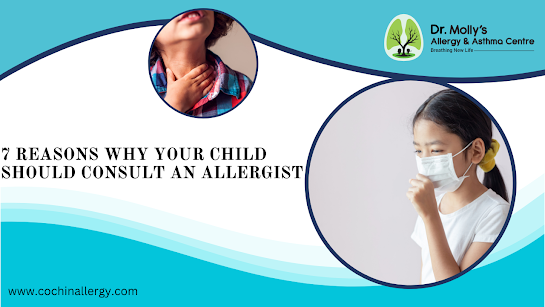7 Reasons Why Your Child Should Consult An Allergist
7 Reasons Why Your Child Should Consult An Allergist
If your child seems to be sick at the same time year after year, it may not be the back to school influx of germs or the flu bug that flies around each winter, it could be allergy. Below are seven common signs that your child should be evaluated by an allergy specialist.
1. Constant Sniffles
Many kids seem to have a constant runny nose, generally considered a cold because they’re regularly around other kids and germs. If the sniffles also include itching, it’s likely an allergy. Colds may involve a fever, where allergies do not.
2. Nasal Crease
Kids don’t always run for a tissue when they need it most. Instead, they resort to the “allergic salute”: wiping their nose upwards with the palm of their hand. After doing this repetitively, it can leave a semi-permanent crease on the lower third of the nose – it’s one of the physical signs of allergic rhinitis
3. Allergic Shiners
Notice dark circles under your child’s eyes? They could be allergic shiners, which often look like bruises. Because the nose is congested when symptoms strike, the small veins under the eyes can also become congested, causing discoloration. It’s not typically painful, but it’s noticeable.
Allergic shiners can appear after exposure to indoor or outdoor environmental allergies, irritants, or food allergies that manifest as nasal symptoms.
4. Unexplained School Interruptions
Unaddressed food and environmental allergies can impact children in the classroom. Symptoms can cause distraction during class hours, but can also lead to sleep loss and daytime fatigue.
Often times these disruptions can be misinterpreted as ADHD, dyslexia and a variety of other conditions.
5. Chronic Ear Infections and adenoid hypertrophy.
Ear infections are also common in children, along with other infections. After a long exposure to problematic allergens, infections are common. For kids with chronic ear infections, and those kids with tubes placed in their ears because of this, allergy could be a cause. Even chronic adenotonsillitis can occur for which some children may be advised to remove the adenoids and tonsills if they experience something called obstructive sleep apnoea wherin their sleep gets disturbed and they have open mouth breathing and constant snoring during sleep
6. Recurrent Hives
Although atopic dermatitis can occur at any age, it most often affects infants and young children, and often looks like hives or dry, itchy skin. Most people with atopic dermatitis, or eczema, have an underlying environmental or food allergy that leads to flare ups after exposure.
Untreated, it can remain a life-long condition and often progresses into other diseases. Eczema is often the first step in the Allergic March – the progression of allergy over time. Many infants start with eczema and go on to develop asthma, environmental allergies and food allergies. Research affirms that intervening with disease modifying treatment early can halt the progression.
7. Wheezing
Similar to eczema, asthma can have an allergy component. This goes for children and adults. Symptoms of asthma include wheezing, shortness of breath, cough, and frequent respiratory infections. If your child is exhibiting asthma symptoms, consider also testing for allergy skin prick testing for aeroallergens
What do all of these conditions have in common?
An underlying allergy. If your child is struggling through one or many of these symptoms, consider having them evaluated for allergy. Getting to the bottom of what is causing the issues via exam, medical history and testing is the first step.
The second step is treatment. Treating the cause of allergy with environmental avoidance measures for allergens and customised sublingual immunotherapy – or allergy drops – is safe for kids as young as 5 years. By modifying the disease, rather than just masking the symptoms, the likelihood of developing other allergies as they grow is decreased. Most importantly, they feel better and are healthier overall.

.jpg)
.jpg)
Comments
Post a Comment